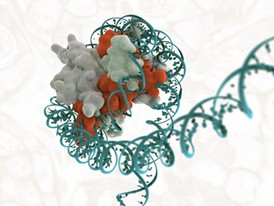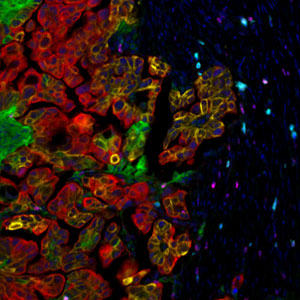PTMScan Proteomics: Identification and Quantification of Post-Translationally Modified Peptides
Protein post-translational modifications (PTMs) regulate all aspects of cellular growth, development, and disease biology. Proteomic analysis of these PTMs has become central to gaining a better understanding of cellular signaling. Current proteomic methods and instrumentation allow for identification of thousands of peptides in a single experiment. PTMScan proteomics from Cell Signaling Technology combine antibody-based enrichment with liquid chromatography-tandem mass spectrometry (LC-MS/MS) for identification and quantitation of post-translationally modified peptides. Products and services are available for analysis of protein phosphorylation, acetylation, ubiquitination, methylation, succinylation, and caspase cleavage from cell lines, tissues, xenografts, or other biological materials (PTMScan Discovery). Services have also been designed for targeted, in-depth coverage of critical signaling pathways (PTMScan Direct). PTMScan methods have been successfully applied to biomarker discovery, drug development, and studies to gain a better understanding of cellular signaling.
Multiplexed Quantitative Ubiquitylome Analysis utilizing Ubiquitin Remnant Immunoprecipitation, nLC-MS/MS, and Isobaric Labels
Large-scale, multiplexed quantitative proteomics experiments have recently become more accessible due to advances in both mass spectrometry instrumentation and reagents. Today, by utilizing isobaric labels (e.g., tandem mass tags), >8,000 proteins can be routinely quantified across 10 experimental samples in 1.5 days of analysis. However, to date, the analysis of the cellular ubiquitylome has been limited in the number of samples that can be multiplexed in one experiment. In this webinar I will highlight sample preparation methods including immunoprecipitation with the PTMScan ubiquitin remnant motif antibody (Cell Signaling Technology) and labeling of resulting peptides with isobaric tags. I will also discuss instrument methods (e.g., synchronous precursor selection MS3, SPS-MS3) that allow for accurate analysis of cellular ubiquitylomes. I will highlight the application of this method in which we quantified the change in >15,000 sites of ubiquitylation simultaneously across 10 quantitative channels upon treatment with Bortezomib.
Speakers

Matthew P. Stokes, PhD, Principal Scientist, Proteomics Group, Cell Signaling Technology, Inc.
Matt Stokes began his scientific career in 1994 as a high school student with an internship at New England BioLabs/Cell Signaling Technology where he worked through college. He received his B.A. in Biology from Colby College in Waterville, ME in 2000. He then pursued his interest in understanding the complexities of cellular signaling pathways at Harvard University in Cambridge, MA where he received his Ph.D. in Biochemistry in 2005. During this time, his work focused on elucidating mechanisms of the DNA damage response using Xenopus laevis egg extracts. Matt joined Cell Signaling Technology in 2005 as a scientist in the Cancer Discovery group, and moved to the Proteomics Group in 2009. Matt currently leads the Proteomics Services Group, providing start-to-finish proteomics solutions for both academic and industry clients.

Christopher Michael Rose, Postdoctoral Research Fellow, Gygi Lab Harvard Medical School
Christopher Rose is a postdoctoral research fellow at Harvard Medical School in the lab of Steven P. Gygi, where he works on developing and applying the latest quantitative mass spectrometry methods. A native of California, he received a B.S. in Biochemistry and Biology from Santa Clara University and a PhD in Analytical Chemistry from the University of Wisconsin – Madison in the lab of Joshua J. Coon.
The Steven P. Gygi lab is located at Harvard Medical School in Boston, MA and is a leader in the development and application of quantitative mass spectrometry methods for the analysis of biological systems.
Who Should Attend?
This webinar will be ideal for academic or pharmaceutical researchers who are interested in using antibody enrichment for mass spectrometry-based proteomics to study how post-translational modifications (PTMs) influence cellular growth, development, and disease biology and treatment.
Xtalks Partner
Cell Signaling Technology
Cell Signaling Technology (CST) is a private, family-owned company, founded by scientists and dedicated to providing high quality research tools to the biomedical research community. Our 400 employees operate worldwide from our headquarters in Danvers, Massachusetts, and our offices in the Netherlands, China, and Japan.
Media Partner
You Must Login To Register for this Free Webinar
Already have an account? LOGIN HERE. If you don’t have an account you need to create a free account.
Create Account




